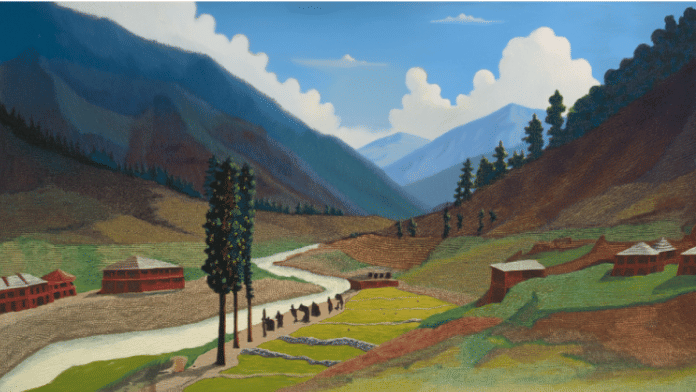Thank you dear subscribers, we are overwhelmed with your response.
Your Turn is a unique section from ThePrint featuring points of view from its subscribers. If you are a subscriber, have a point of view, please send it to us. If not, do subscribe here: https://theprint.in/subscribe/
Rajdeep Sardesai was talking with Rauf, a ponywallah at the footsteps of Baisaran Valley, when the ponywallah proclaimed that ‘next time, they will not face the Army, the CRPF, they will face us, people of Kashmir’. In other on ground coverage by Medha Yadav, locals openly called for security forces to tighten the measures required to make the valley safe for tourists. Needless to even bring up the unprecedented anti-terror protests in the valley following the Pahalgam attack. These are incidents and sentiments worth taking note of. Now is the time for Delhi to recognize this shift.
Where in the past, the most optimistic expectation following any form violence in the valley was a hope for an uneasy silence, this time things took a rather unexpected turn – taking virtually everyone by surprise. Kashmir protested against the attack openly and spoke out vehemently against it. Maybe the reaction was because victims were tourists, or because of the black mark on Kashmiriyat they felt this attack left, or because of fatigue and unwillingness to go back to a violent valley again, or maybe it was the paranoia at the thought of valley getting over-militarised again, or due to the direct economic impact of this incident. Perhaps it might be a mix of all these reasons and much more.
Anyone who remains largely critical of the BJP led NDA, should acknowledge this outcome and give credit where credit is due. There seems to be a cascading consequence of abrogation of Article 370 and opening up the Kashmiri economy, albeit under the Centre’s iron fist, to the rest of the country. A change wrought with force in the absence of local support, but a change leading to some positive outcomes for the local population nevertheless. And credit needs to be accorded to Delhi for this, even if given begrudgingly.
Economy has boomed, tourism has given a glimmer of hope for a brighter future, and most importantly, cultural exchange has been facilitated, helping Kashmiris talk with the rest of the country more, and vice versa.
But these changes do not mean Kashmiris are all happy. Just last year, the onground coverage by various journalists of General Elections 2024 and J&K Assembly Elections reflected an uneasy local populace – exploring democratic pathways reluctantly in post-370 Kashmir valley. Of course, there was not a lot in the way of an openly defiant Anti-Indianism in Kashmir valley, perhaps due to the fear of the ironfist. But there was a sense of muted acceptance in corners that ‘what’s done, is done’.
Vigorously campaigning, actively political Kashmiris showcased through the results of Assembly elections a cautious optimism towards a potential path forward – with the primary goal of reclaiming statehood, focus on the growth in economy, and fewer lives lost to violence going forward. The mistrust towards Delhi still remained in the midst of all this.
However, the mistrust doesn’t seem to be the only inviolable truth. There was also active democratic vibrancy which looked at using state provisions to chart Kashmir’s future – starting with the demand of statehood.
The peace seems to have provided Kashmir with time to reflect on economy and democratic pathways.
The passionate plea still persists, asking the rest of the country to not otherise Kashmiris, or hyphenate Kashmiris with militancy or terrorism.
In the backdrop of all these contesting strings, the protests denouncing the Pahalgam terror attack seem to be that Black Swan event which could well be the inflection point towards a positive future.
Delhi needs to recognize the significance of this.
We are currently presented with a golden opportunity to make good with our Kashmiri brethren, not with suspicion and force, but with collaboration and appreciation. Those who came out on the streets with candles and Black Day protests, those who said they lost their appetite for days following the attack, those who call for a befitting response against perpetrators, those who ask security to ensure all measures necessary to protect tourists, those who are worries about economy, those who are deeply traumatised by the thought of an impending return of the valley to violence and oppression, these are the people who can help change the path of India and Kashmir within India.
While all India awaits a befitting response to Pakistan, there are many options being explored to give a stern and deterring response – militarily, economically, diplomatically, and maybe through covert action. At this point of time, I wonder if there could be a better response to Pakistan than those protesting Kashmiris standing next to Delhi out in the open, and proclaim in defiance against all claims of Pakistan – ‘not in my name’.
It is time to put the final nail in the coffin of Pakistani rhetoric which claims they do these dastardly attacks for the people of Kashmir, and they want to save Kashmir from India.
More than military, more than water, it is perhaps through defiant Kashmiri tongues, that Pakistan can suffer its worst defeat thus far.
These pieces are being published as they have been received – they have not been edited/fact-checked by ThePrint.


